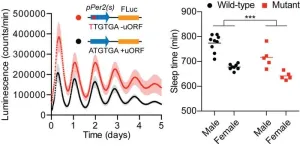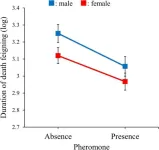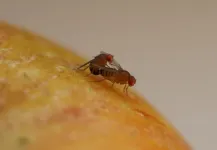(Press-News.org) UVA Health researchers have developed a powerful new tool to understand how medications affect men and women differently, and that will help lead to safer, more effective drugs in the future.
Women are known to suffer a disproportionate number of liver problems from medications. At the same time, they are typically underrepresented in drug testing. To address this, the UVA scientists have developed sophisticated computer simulations of male and female livers and used them to reveal sex-specific differences in how the tissues are affected by drugs.
The new model has already provided unprecedented insights into the biological processes that take place in the liver, the organ responsible for detoxifying the body, in both men and women. But the model also represents a powerful new tool for drug development, helping ensure that new medications will not cause harmful side effects.
“There are incredibly complex networks of genes and proteins that control how cells respond to drugs,” said UVA researcher Jason Papin, PhD, one of the model’s creators. “We knew that a computer model would be required to try to answer these important clinical questions, and we’re hopeful these models will continue to provide insights that can improve healthcare.”
Harmful Effects From Drugs
Papin, of UVA’s Department of Biomedical Engineering, developed the model in collaboration with Connor Moore, a PhD student, and Christopher Holstege, MD, a UVA emergency medicine physician and director of UVA Health’s Blue Ridge Poison Center. “It is exceedingly important that both men and women receive the appropriate dose of recommended medications,” Holstege noted. “Drug therapy is complex and toxicity can occur with subtle changes in dose for specific individuals.”
Before developing their model, the researchers first looked at the federal Food and Drug Administration’s Adverse Event Reporing System to evaluate the frequency of reported liver problems in men and women. The scientists found that women consistently reported liver-related adverse events more often than did men.
The researchers then sought to explain why this might be the case. To do that, they developed computer models of the male and female livers that integrated vast amounts of data on gene activity and metabolic processes within cells. These cutting-edge liver simulations provided important insights into how drugs affect the tissue differently in men and women and allowed the researchers to understand why.
“We were surprised how many differences we found, especially in very diverse biochemical pathways,” said Moore, a biomedical engineering student in Papin's lab. “We hope our results emphasize how important it is for future scientists to consider how both men and women are affected by their research.”
The work has already identified a key series of cellular processes that explain sex differences in liver damage, and the scientists are calling for more investigation of it to better understand “hepatotoxicity” – liver toxicity. Ultimately, they hope their model will prove widely useful in developing safer drugs.
“We’re hopeful these approaches will be help address many other questions where men and women have differences in drug responses or disease processes,” Papin said. “Our ability to build predictive computer models of complex systems in biology, like those in this study, is truly opening all kinds of new avenues for tackling some of the most challenging biomedical problems.”
Findings Published
The researchers have published their findings in the scientific journal PLOS Computational Biology. The article is open access, meaning it is free to read. The UVA researchers have no financial interest in the work.
The research was supported by the National Institutes of Health, grants R01-DK132369 and T32-GM145443.
UVA’s Department of Biomedical Engineering is a joint program of the School of Medicine and the School of Engineering and Applied Science.
To keep up with the latest medical research news from UVA, subscribe to the Making of Medicine blog.
END
New tool reveals how drugs affect men, women differently -- and will make for safer medications
2023-10-02
ELSE PRESS RELEASES FROM THIS DATE:
Researchers develop mixture of compounds to help preserve organs before transplantation
2023-10-02
Using zebrafish as a model, investigators have determined a suitable combination of chemical compounds in which to store hearts, and potentially other organs, when frozen for extended periods of time before transplantation.
The work, which is published in The FASEB Journal, involved a variety of methods, including assays at multiple developmental stages, techniques for loading and unloading agents, and the use of viability scores to quantify organ function.
These methods allowed scientists to perform the largest and most comprehensive screen of cryoprotectant agents to determine their toxicity and efficiency at preserving ...
A surprising way to disrupt sleep
2023-10-02
Osaka, Japan - Circadian rhythms, the internal biological clocks that regulate our daily activities, are essential for maintaining health and well-being. While the role of transcription in these rhythms is well-established, a new study sheds light on the critical importance of post-transcriptional processes. The research, titled “Circadian ribosome profiling reveals a role for the Period2 upstream open reading frame in sleep,” to be published in PNAS, redefines our understanding of how translation and post-transcriptional processes influence the body’s internal clock and its impact on sleep patterns.
Timing Is Everything: ...
To Eat or Not to Eat: Targeting autophagy to enhance memory immune responses
2023-10-02
Osaka, Japan – Memory B cells depend on autophagy for their survival, but the protein Rubicon is thought to hinder this process. Researchers from Osaka University have discovered a shorter isoform of Rubicon called RUBCN100, which enhances autophagy in B cells. Mice that lacked the longer isoform, RUBCN130, produced more memory B cells in a way that relied on autophagy. These findings provide further insight into the role of Rubicon in autophagy.
Autophagy is a mechanism that degrades and ...
Researchers find a cause of Parkinson’s disease
2023-10-02
Until recently, our understanding of Parkinson's disease has been quite limited, which has been apparent in the limited treatment options and management of this debilitating condition.
Our recent understanding has primarily revolved around the genetic factors responsible for familial cases, while the causative factors in the vast majority of patients remained unknown.
However, in a new study, researchers from the University of Copenhagen have unveiled new insights into the workings of the brain in Parkinson's patients. Leading the groundbreaking discovery is Professor Shohreh Issazadeh-Navikas.
“For the first time, we can show that mitochondria, ...
Pheromones influence death feigning behavior in beetles
2023-10-02
Predation is a driving force in the evolution of anti-predator strategies, and death feigning, characterized by immobility in response to threats, is a common defensive mechanism across various animal species. While this behavior can enhance an individual's survival prospects by reducing a predator's interest, it also carries costs, such as limited opportunities for feeding and reproduction. Recently, researchers from Okayama University, Japan, investigated how pheromones, important chemical signals that affect foraging and reproduction, might influence death-feigning behavior in the red flour beetle, Tribolium castaneum.
“Male beetles release an aggregation pheromone called ...
Genetics of attraction: mate choice in fruit flies
2023-10-02
Genetic quality or genetic compatibility? What do female fruit flies prioritize when mating? Researchers at the University of Zurich show that both factors are important at different stages of the reproductive process and that females use targeted strategies to optimize the fitness of their offspring.
Breeding female fruit flies face a difficult decision: do they mate with the male that has the best genes, or with the one whose genes best match their own? Evolutionary biologists from the University of Zurich and Concordia University have now investigated ...
FAU Engineering study employs deep learning to explain extreme events
2023-10-02
Identifying the underlying cause of extreme events such as floods, heavy downpours or tornados is immensely difficult and can take a concerted effort by scientists over several decades to arrive at feasible physical explanations.
Extreme events cause significant deviation from expected behavior and can dictate the overall outcome for a number of scientific problems and practical situations. For example, practical scenarios where a fundamental understanding of extreme events can be of vital importance include rogue waves in the ocean that could endanger ships and offshore structures or increasingly ...
New study uncovers potential treatment for non-alcoholic fatty liver disease
2023-10-02
A breakthrough study, jointly led by Professor Jang Hyun Choi and Professor Sung Ho Park from the Department of Biological Sciences at UNIST has identified an important factor involved in the development of non-alcoholic fatty liver disease (NAFLD) caused by obesity. The research team discovered that Thrap3, a protein associated with thyroid hormone receptors, plays a significant role in exacerbating NAFLD by inhibiting the activity of adenosine monophosphate-activated protein kinase (AMPK), a key regulator of fat metabolism in the liver.
NAFLD encompasses various metabolic diseases such as fatty hepatitis and cirrhosis resulting from excessive fat accumulation. ...
Susan G. Komen® analysis shows many breast cancer patients struggle to afford basic needs: Housing, transportation, utilities
2023-10-02
Lower income breast cancer patients often struggle to afford life’s necessities such as housing, transportation and utilities due to direct and incidental costs related to their treatment, according to a new analysis by Susan G. Komen®, the world’s leading breast cancer organization. These top needs were identified by Susan G. Komen’s Patient Care Center, which provided nearly $9.1 million in grants to more than 16,000 breast cancer patients from April 1, 2022 to March 31, 2023, as part of Komen’s direct-to-patient ...
Dense measurement network revealed high level of PM2.5 in Punjab due to crop residue burning and its transport to Haryana and Delhi NCR
2023-10-02
A group of international collaborators led by the Research Institute for Humanity and Nature (RIHN) team performed the first quantitative study of air pollution in the north-western India region using 29 low-cost and reliable instruments, demonstrating the advantages of source region observations to link crop residue burning (CRB) and air pollution at local to regional scales.
Exposure to particulate matter less than 2.5 µm in diameter (popularly known as PM2.5) causes health hazards in cities and major emission regions of the world. Although the major sources ...







